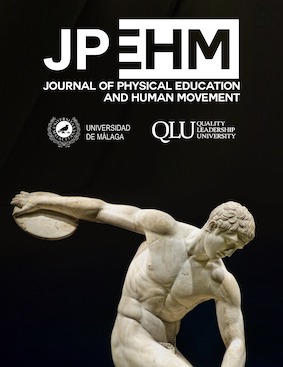CORRELAÇÕES ENTRE CONDIÇÃO FÍSICA E RENDIMENTO ACADÊMICO EM ESTUDANTES DE GRADUAÇÃO
DOI:
https://doi.org/10.24310/JPEHMjpehm.v2i1.6770Palavras-chave:
Desempenho acadêmico, condição física, estudante universitário, gênero, exercício, fumarResumo
Introdução: Poucos estudos examinaram o efeito do nível de condicionamento físico Física no sucesso acadêmico em estudantes universitários. Objetivos: O objetivo do estudo é determinar a relação entre aptidão física e sucesso acadêmico em estudantes estudantes universitários Material e método: Participaram do estudo 183 estudantes universitários. Por Para determinar a aptidão física, foi utilizada a bateria Fitnessgram. Os alunos foram agrupados relativamente ao estado do sucesso académico de acordo com as qualificações académicas gerais. Resultados: O sucesso acadêmico foi avaliado como baixo em 16,1% (n: 15) das mulheres, moderada em 38,7% (n: 36) e alta em 45,2% (n: 42), e em estudantes do sexo masculino foi determinado nível baixo em 18,9% (n: 17), moderado em 52,2% (n: 47) e alto em 28,9% (n: 26). eu sei
descobriram que fumar cigarros fez a diferença em mulheres com baixo sucesso acadêmico (p <.05). A diferença foi determinada entre os grupos de baixo e alta de ambos os sexos quanto à aptidão física (p<0,05). Em testes de aptidão física, foi observada uma relação com a média geral de pontos acadêmicos em todos os alunos, Com exceção do índice de massa corporal (IMC), foi determinada uma relação entre outros parâmetros e sucesso acadêmico (p <.05). Conclusões: Um alto nível de condição física contribui positivamente para o sucesso acadêmico. Não foi encontrada relação entre o IMC nas mulheres e a média geral de pontos acadêmicos. Em mulheres com baixo sucesso acadêmico a taxa de tabagismo foi maior.
Downloads
Métricas
Referências
Blom, L. C., Alvarez, J., Zhang, L., Kolbo, J. (2011). Associations between Health-Related Physical Fitness, Academic Achievement and Selected Academic Behaviors of Elementary and Middle School Students in the State of Mississippi. ICHPER-SD Journal Of Research, 6(1), 13-19.
Calestine, J., Bopp, M., Bopp, C. M., Papalia, Z. (2017). College student work habits are related to physical activity and fitness. International journal of exercise science, 10(7), 1009.
Carlson, S. A., Fulton, J. E., Lee, S. M., Maynard, L. M., Brown, D. R., Kohl III, H. W., Dietz, W. H. (2008). Physical education and academic achievement in elementary school: data from the early childhood longitudinal study. American journal of public health, 98(4), 721-727.
Castelli, D. M., Hillman, C. H., Buck, S. M., Erwin, H. E. (2007). Physical fitness and academic achievement in third-and fifth-grade students. Journal of Sport and Exercise Psychology, 29(2), 239-252.
Chomitz, V. R., Slining, M. M., McGowan, R. J., Mitchell, S. E., Dawson, G. F., Hacker, K. A. (2009). Is there a relationship between physical fitness and academic achievement? Positive results from public school children in the northeastern United States. Journal of School Health, 79(1), 30-37.
Eveland-Sayers, B. M., Farley, R. S., Fuller, D. K., Morgan, D. W., Caputo, J. L. (2009). Physical fitness and academic achievement in elementary school children. Journal of Physical Activity and Health, 6(1), 99-104.
Gutin, B., Manos, T., Strong, W. (1992). Defining health and fitness: First step toward establishing children's fitness standards. Research Quarterly for exercise and Sport, 63(2), 128-132.
Jeoung, B. J., Hong, M. S., Lee, Y. C. (2013). The relationship between mental health and health-related physical fitness of university students. Journal of exercise rehabilitation, 9(6), 544.
Kwak, L., Kremers, S. P., Bergman, P., Ruiz, J. R., Rizzo, N. S., Sjöström, M. (2009). Associations between physical activity, fitness, and academic achievement. The Journal of pediatrics, 155(6), 914-918.
London, R. A., Castrechini, S. (2011). A longitudinal examination of the link between youth physical fitness and academic achievement. Journal of School Health, 81(7), 400-408.
Rasberry, C. N., Lee, S. M., Robin, L., Laris, B. A., Russell, L. A., Coyle, K. K., Nihiser, A. J. (2011). The association between school-based physical activity, including physical education, and academic performance: a systematic review of the literature. Preventive medicine, 52, S10-S20.
Scheuer, L. J., Mitchell, D. (2003). Does physical activity influence academic performance. The New PE and Sport Dimension, 12.
Scott, S. P., De Souza, M. J., Koehler, K., Murray-Kolb, L. E. (2016). Combined iron deficiency and low aerobic fitness doubly burden academic performance among women attending university. The Journal of nutrition, 147(1), 104-109.
Simpson, W. F., Brehm, H. N., Rasmussen, M. L., Ramsay, J., Probst, J. C. (2002). Health and fitness profiles of collegiate undergraduate students. HEALTH, 5(3).
Van Dusen, D. P., Kelder, S. H., Kohl III, H. W., Ranjit, N., Perry, C. L. (2011). Associations of physical fitness and academic performance among schoolchildren. Journal of School Health, 81(12), 733-740.
Wengaard, E., Kristoffersen, M., Harris, A., Gundersen, H. (2017). Cardiorespiratory fitness is associated with selective attention in healthy male high-school students. Frontiers in human neuroscience, 11, 330.
Wittberg, R. A., Northrup, K. L., Cottrel, L. (2009). Children’s physical fitness and academic performance. American Journal of Health Education, 40(1), 30-36.
Downloads
Arquivos adicionais
Publicado
Como Citar
Edição
Seção
Licença
Aquellos autores/as que tengan publicaciones con esta revista, aceptan los términos siguientes:
- Los autores/as conservarán sus derechos de autor y garantizarán a la revista el derecho de primera publicación de su obra, el cuál estará simultáneamente sujeto a la Licencia de reconocimiento de Creative Commons que permite a terceros compartir la obra siempre que se indique su autor y su primera publicación esta revista.
- Los autores/as podrán adoptar otros acuerdos de licencia no exclusiva de distribución de la versión de la obra publicada (p. ej.: depositarla en un archivo telemático institucional o publicarla en un volumen monográfico) siempre que se indique la publicación inicial en esta revista.
- Se permite y recomienda a los autores/as difundir su obra a través de Internet (p. ej.: en archivos telemáticos institucionales o en su página web) antes y durante el proceso de envío, lo cual puede producir intercambios interesantes y aumentar las citas de la obra publicada. (Véase El efecto del acceso abierto).







15.png)
